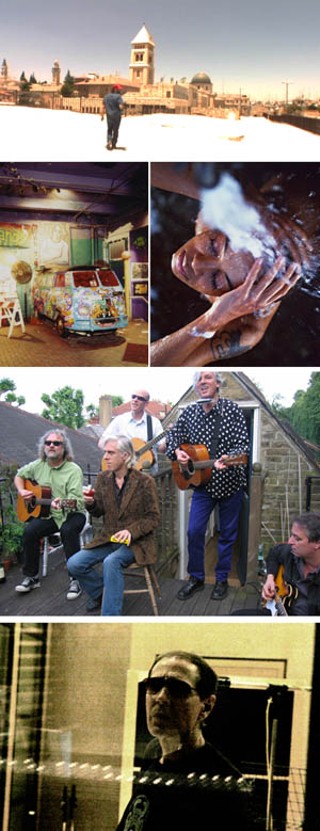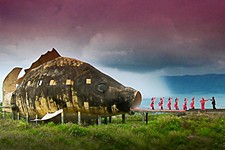Perfect Liberty
To find themselves, the subjects of this year's rock docs found that they had to follow their own sound
By Josh Rosenblatt, Fri., March 9, 2007

Back in the early Nineties, the independent-rock movement in America was in its high renaissance, still underground enough to exist off the radar of most major labels but sufficiently past its punk roots to have matured into its own particular – and particularly American – art form. Moving away from the political and social sloganeering of the early Reagan years (rock had already ceded that ground to hip-hop), the indie rock community was coalescing into a loose-knit assembly of postgraduate disaffection: Heavy on detuned guitars and murky lyrics, light on any overt display of emotion or social sentiment, abstraction was king.
At the center of this movement was David Berman, a recent University of Virginia graduate and adopted New Yorker who, along with his friend Stephen Malkmus, was helping to redefine rock music in the Bush I era by alleviating it of its grandeur and directness, leaving little but its outlines – a few simple chords, a basic backbeat, a touch of distorted guitar – and a vague yet refreshing admission that people like them probably had no business playing it.
Recording their songs onto Walkmans and answering machines under the name Silver Jews, Berman and Malkmus took rock music to new heights of lo-fi modesty. With their mumbly, monotone vocals and cryptic, literate lyrics ("Fake IDs and honeybees/the jagged skyline of car keys/I never knew the bird could fly so low"), they laid the groundwork for a whole new generation of reluctant pop stars: mussy-haired cynics who wore their ironic detachment as a defensive cloak against the empty shimmer of commercialism and the earnest emotionalizing of the straight world.
Malkmus would soon become an indie giant with his band Pavement – a group that elevated ironic detachment to beatified levels – while Berman stuck with Silver Jews, recording five albums over the next 11 years, each a catalog of shrugging emotions, and releasing a book of poetry that, amazingly, sold some 20,000 copies. Not a bad little life, taken all in all. But while Berman was enjoying his modest success – more cult figure than anything else, a private genius to those who knew of him – he could only watch as Malkmus and Pavement became the superstars and poster children of indie rock. As the decade progressed, he gradually sank into a drug addiction.
Flash forward to 2001. Following the release of the Jews' EP Tennessee, Berman drops into a depression. Disconsolate, he attempts suicide by overdose and winds up in a psychiatric ward. He follows this with a voluntary stint in a rehab clinic, where he discovers the saving power of Judaism, a religion that up until that point had been his in name (both band and sur-) only. Clean and revivified, Berman reunites Silver Jews and releases 2005's triumphant Tanglewood Numbers, with a new, more hi-fi sound backing his heady lyrics about addiction and ironic nods to his newfound faith ("Later I came to find/life is sweeter than Jewish wine"). Album completed, the notoriously homebound Berman decides to set out on the road, playing his first-ever live shows to grateful fans around the world, with a particularly resonant stop in Israel, land of Adonai, God of Abraham, Isaac, Jacob, and now David.
Director Michael Tully's Silver Jew – showing as part of this year's SXSW Film 24 Beats per Second series – documents Berman's brief sojourn in Israel, following him from the nightclubs of Tel Aviv to the Western Wall. Like much of Berman's music, the film's modesty is its calling card. Most of it passes like a run-of-the-mill rock-band travelogue: Berman shops for trinkets with his wife; Berman plays shows for adoring fans; Berman meets adoring fans. But toward its end, as Berman traces the back streets of the Old City of Jerusalem – descending into King David's tomb, gazing on the Temple Mount, searching for what he calls the "pure, spiritual Israel" – the film, like the life of Berman himself, becomes something else entirely, evolving from ironic observation to full-on pilgrimage, a search for truth and redemption in a sordid world.
Watching Berman the Jew wrap himself in tefillin (traditional prayer straps) and recite the Shema Yisrael ("Hear, O Israel") at the Western Wall, the holiest spot in all of Judaism, with tears streaming down his face, is like watching a man meeting himself in a dark alleyway and recognizing the face he sees for the first time. Watching Berman the performer walk off the stage and out into the crowd at the close of a concert in a Jerusalem nightclub, arms outstretched, basking in the glow of joyous fans, is like watching a man emerge from baptismal waters, shaking off the last remnants of his past.
David Berman, the poet laureate of opacity, has gotten clean at last.
The musicians that descended upon the old Wetlands Preserve nightclub in New York City during the Eighties and Nineties weren't looking to get themselves clean. Far from it. Most of these bands were acolytes of the hippie ideal of the Sixties, which was recognizable as much by its dirtiness as its high ideals of communal love and freethinking. These bands were the sons and daughters of the Grateful Dead, perpetually touring acts with a shared love of perpetual music, jam bands of the new school whose idea of a good time was to take a bare-bones song and explore its variations at length – sometimes interminably – until the thing had been wrung dry and the musicians exploring it and the fans listening to it were soaking wet. Their search was for revival music of a distinctly secular, even earthy, sort.
The existence of the Wetlands, lovingly chronicled in Dean Budnik's Wetlands Preserved: The Story of an Activist Rock Club, was an improbable one: a hippie refuge in the middle of downtown New York City in the late Eighties, a time when fashionable dance clubs were filled with post-Weimar fashionistas, postmodern performance artists, and Hollywood celebrities; a bar dedicated as much to social activism as moneymaking; a rock & roll club that not only allowed but expected its acts to play long past closing time. Upstairs, bearded bands wailed on their guitars for hours, while downstairs, patrons gathered to smoke pot, bang on bongos, and bemoan the destruction of the Peruvian rainforest. According to Michael Musto, columnist for The Village Voice and arbiter of all things fabulous in New York, the Wetlands was the ultimate rebellious anachronism in a city full of them: "They didn't get the message that hippies were over," he says, "like the dinosaurs."
For many bands touring outside the confines of mainstream music in the 1990s, getting to the Wetlands was a pilgrimage, a place where their kind could gather and revel in their strangeness and sameness. Like David Berman scouring the Old City of Jerusalem, bands like Blues Traveler, Phish, Dave Matthews Band, Widespread Panic, and others came to the Wetlands looking for their spiritual center, where like-minded bands and fans (who, for whatever reason, loved their songs more the longer they lasted) could gather and find common ground in music and social concerns, free of the approval of the music and culture industries. The club consolidated and gave an identity to an otherwise scattered and disorganized countrywide jam-band scene and gave comfort to musicians and fans who thought they were the only freaks around.
How you view the legacy of the Wetlands will depend mainly on where you come down on jam music in general. If you believe there's freedom to be found in improvisation – that the excitement of music is in watching performers walk a tightrope in front of an audience, regardless of the length of that tightrope – and that there should be no separation between a band, a club, and their political philosophies, then you'll probably see the club as a beacon in a black night. If, however, you see jam bands as the ultimate example of creative self-indulgence and their fans as cultists who, through excessive drug use and exposure to tie-dyed clothing, have dulled their critical faculties and fooled themselves into believing that there's some sort of connection between long-winded personal expression and art, then the club will probably be nothing more than a sweaty dungeon you're glad you avoided. But, watching Wetlands Preserved, it's hard not to appreciate the idealism and unbridled optimism of an activist nightclub that survived in New York City for more than 10 years before being beaten down by the one-two-three punch of Mayor Rudolph Giuliani, rampant gentrification, and the collapse of the twin towers.
"The soul of a journey is liberty, perfect liberty, to think, feel, do just as one pleases," wrote essayist William Hazlitt in the early 19th century. One hundred fifty years later, the neo-hippie bands made it to New York from all over the country to do as they pleased; David Berman traveled all the way to Israel to do the same. In a world bent on the mass production of human personality, the long road to freedom is, in essence, just a returning to the self, same as it was in Hazlitt's time.
In Stephen Kijak's Scott Walker: 30 Century Man, Brian Eno, David Bowie, and a host of other music luminaries line up to praise one of the oddest singers in the history of pop music. They call his music brilliant, the work of a genius and a visionary. They honor his songwriting skills and his recording techniques; they pay tribute to his cryptic lyrics and lugubrious, almost cantorial voice. What I realized watching the film, however, is that what artists truly respect about Scott Walker – more than his songs, more than his words – is his indefatigable dedication to the voice inside his own head, regardless of the chatter of the music industry that tried with all its might to pigeonhole him. There's a sense among the film's participants and producers that Walker never went in any direction that wasn't toward himself. And they speak of him with reverence for it.
Walker began his career in the mid-Sixties as one-third of the Walker Brothers, a pop trio from Los Angeles that topped the charts in the UK. With his matinee-idol looks, wavy hair, and crooner's voice, Walker was a teen sensation, and his presence at music venues would set off "Walker Fan Mania!" among Britain's hormonal youth. But Walker was unsatisfied with life as a pop star, and with his subsequent solo albums, he pushed pop music into mysterious new territory, territory only hinted at by fellow mad geniuses Phil Spector and Brian Wilson. By the mid-Seventies, Walker had turned his orchestral pop into a gloomy, gothic lament for post-swinging London and his crooner's voice into the sound of syrupy doom. With each passing album, he drove his string sections further and further away from concordance and into the dissonant, often maddening realms of György Ligeti and other avant-gardists. And, with each passing album, he lost more and more fans and dove deeper into obscurity and industry irrelevance.
30 Century Man takes us into the recording studio, where Walker is working on The Drift, his latest album and his first in 10 years. So far outside the mainstream of modern music by this point as to be almost nonexistent, Walker, now in his mid-60s, continues to find new avenues to explore, going so far as to enlist the aid of braying donkeys and slapped sides of beef to punctuate his epic dirges. His songs sound like ballads from another dimension or at least another state of mind – intoxicating in the way a bad drug experience is intoxicating. Love him or hate him, Walker can't be denied because he refuses to allow others the power to deny him; he'll keep making music as long as there's music to be made. Or he won't. You can't know. Either way, the music he's made up to this point is sufficiently unnerving for me.
I don't know what madman is paying for all that studio time, but it must be someone who recognizes that Walker is out there bravely charting unmapped depths for the rest of us tentative souls, journeying down into the abyss so we don't have to. ![]()
24 BEATS PER SECOND
1 More Hit
World Premiere
Sunday, March 11, 9:30pm, Alamo South LamarWednesday, March 14, 2pm, Alamo South Lamar
Companeras
World Premiere
Monday, March 12, 7:30pm, DobieWednesday, March 14, noon, Dobie
Dirty Country
World Premiere
Wednesday, March 14, 9:45pm, Alamo DowntownSaturday, March 17, 6:45pm, Alamo Downtown
The Gits
World Premiere
Friday, March 9, 9:45pm, Alamo DowntownThursday, March 15, 4:30pm, Austin Convention Center
James Blunt: Return to Kosovo
World Premiere
Saturday, March 10, 9:15pm, Alamo South LamarThursday, March 15, 4pm, Alamo South Lamar
The Last Days of Left Eye
North American Premiere
Tuesday, March 13, 8pm, ParamountWednesday, March 14, 11am, Paramount
Robyn Hitchcock: Sex, Food, Death, and Insects
World Premiere
Friday, March 16, 11am, Alamo DowntownScott Walker: 30 Century Man
North American Premiere
Tuesday, March 13, 7:15pm, Alamo DowntownThursday, March 15, 1:45pm, Alamo Downtown
Silver Jew
World Premiere
Sunday, March 11, 11:30am, Alamo South LamarWednesday, March 14, 4:30pm, Alamo South Lamar
Wetlands Preserved: The Story of an Activist Rock Club
Regional Premiere
Wednesday, March 14, 9pm, Austin Convention CenterSaturday, March 17, 2pm, Austin Convention Center
RETROSPECTIVE
Imagine the Sound
Monday, March 12, 4:30pm, Alamo South LamarThursday, March 15, 1:30pm, Alamo South Lamar












